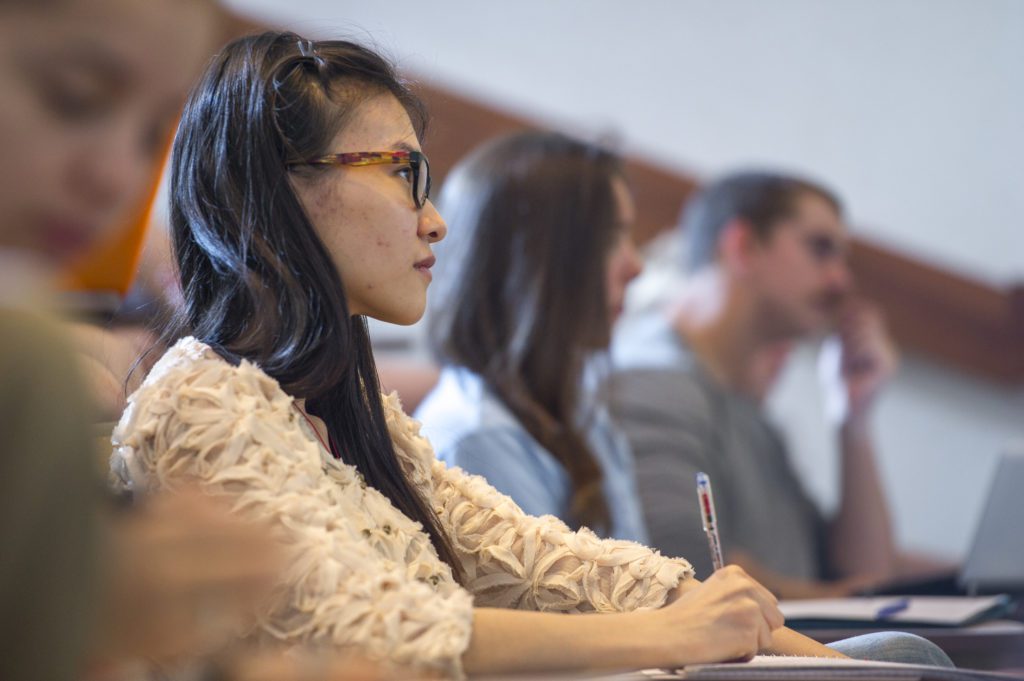Master of Education
Earlham’s M.Ed. program is for college graduates who want to enter or further their career in education. Like the M.A.T. program, the M.Ed. program leads to a master’s degree, but it does not lead to additional licensure. The traditional program follows an 11-month sequence (June to May), and there is also a two-year option for candidates who prefer a less time-intensive commitment.
The M.Ed. is an individualized and comprehensive program that allows students to apply the theory from their master’s courses directly into their chosen fieldwork. M.Ed. candidates complete a summer practicum and a year-long practicum, both of which have the option of being job-embedded. Flexibility and individual attention are key features of the M.Ed. program; faculty and students work together to ensure that coursework and fieldwork are relevant to the candidate’s career focus and schedule.
Recent graduates of Earlham with an interest in teacher education have pursued advanced studies at such universities as Brown, Chicago, Wisconsin, Columbia, Duke, Illinois and Indiana. Graduates are teaching at the elementary, secondary and college levels in public and private institutions in America and abroad. Others are following careers in outdoor education, educational nonprofits, educational media and technology, museum work, journalism, and library science.

Earlham School of Religion
We also partner with the Earlham School of Religion to support Master of Divinity and Master of Ministry students wishing to pursue the teaching emphasis. M.Div./M.Min. students begin the emphasis in the summer of their second year.
Required sequence of courses
- ED 520 Foundations in Education (June)
- ED 522 Learning Theories (Fall semester)
- ED 531 Curriculum, Instruction, and Assessment (Fall semester)
The fourth course required for the emphasis may be chosen from:
- ED 520 Human and Moral Development (June)
- ED 591 Teacher as Researcher (Fall semester)
- A related course from the ESR or Bethany Theological School curriculum.
About
Academics
Admissions & Financial Aid
Contact
Ready to learn more?
Complete a short form and we’ll be in touch with more information about Earlham’s Graduate Programs in Education.
Start your adventure
Interested in pursuing your master’s degree in education?
Course schedule for 11-month M.Ed.
- ED 610 Foundations of Education (3 credits)
- ED 620 Adolescent Learning Processes and Cognitively Diverse Learners (4 credits)
- ED 631 Curriculum and Instruction I (2 credits)
- ED 660 Practicum I (2 credits)
View our course catalog for a full list of course offerings.
- ED 623 Structural Equity in Education (2 credits)
- ED 632 Curriculum and Instruction II (2 credits)
- ED 633 Assessment and Using Data for Student Success (3 credits)
- ED 661 Practicum II (2 credits)
- ED 680 Professional Educator I (2 credits)
View our course catalog for a full list of course offerings.
- ED 662 Practicum III (3 credits)
- ED 681 Professional Educator II (2 credits)
- ED 682 Career Pathways in Education (4 credits)
- ED 690 Educator as Researcher (3 credits)
View our course catalog for a full list of course offerings.
Course schedule for 2-year M.Ed.
- ED 610 Foundations of Education (3 credits)
- ED 620 Adolescent Learning Processes and Cognitively Diverse Learners (4 credits)
View our course catalog for a full list of course offerings.
- ED 623 Structural Equity in Education (2 credits)
- ED 680 Professional Educator I (2 credits)
View our course catalog for a full list of course offerings.
- ED 681 Professional Educator II (2 credits)
- ED 682 Career Pathways in Education (4 credits)
View our course catalog for a full list of course offerings.
- ED 631 Curriculum and Instruction I (2 credits)
- ED 660 Practicum I (2 credits)
View our course catalog for a full list of course offerings.
- ED 632 Curriculum and Instruction II (2 credits)
- ED 633 Assessment and Using Data for Student Success (3 credits)
- ED 661 Practicum II (3 credits)
View our course catalog for a full list of course offerings.
- ED 662 Practicum III (3 credits)
- ED 690 Educator as Researcher (3 credits)
View our course catalog for a full list of course offerings.